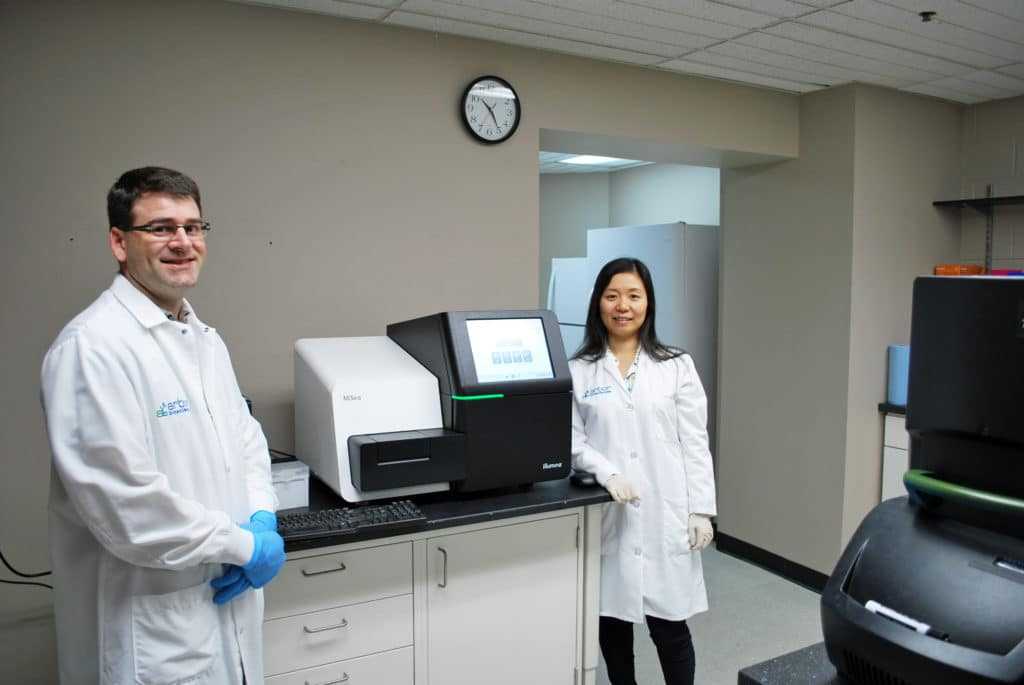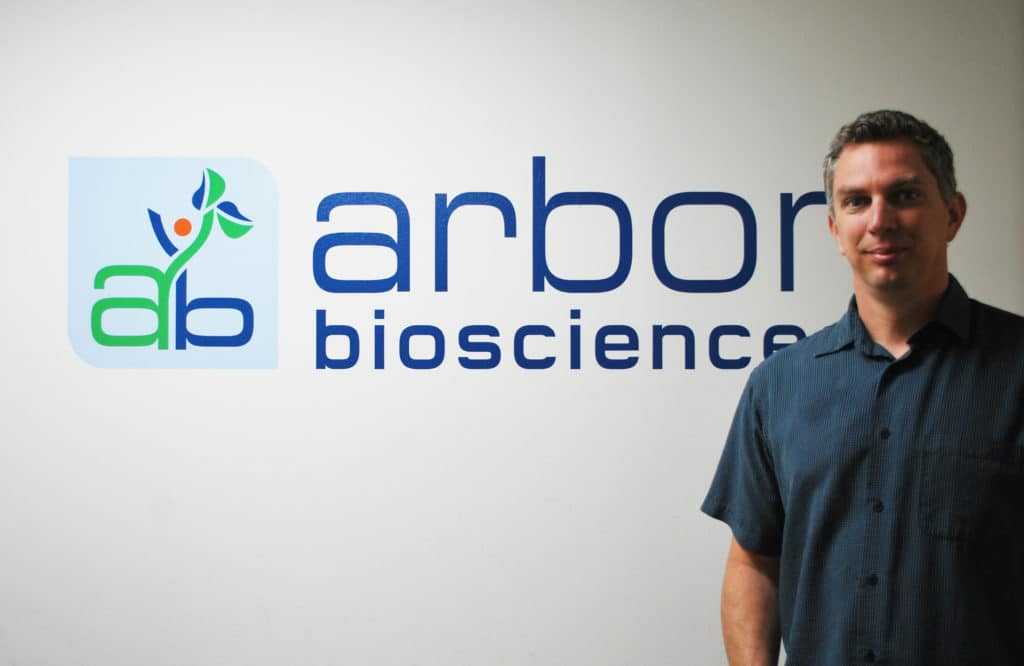ArborBiosciences Offers Free Kits to COVID-19 Researchers To Sequence Virus DNA
By Laura Cowan
Laura K. Cowan is a tech, business, and wellness journalist and fantasy author whose work has focused on promoting sustainability initiatives and helping individuals find a sense of connection with the natural world.
Scientists with Arbor Biosciences in Ann Arbor stand next to a genomics sequencing machine that enables their work sequencing unique genomes for a host of applications.
University of Michigan startup Arbor Biosciences announced this afternoon that it is providing free kits to capture the genetic code of virus samples for researchers working on COVID-19 sequencing. According to a press release sent out by the University of Mchigan, "variations in the virus's genetic code reveal how the virus has morphed over time—for instance, enabling it to change from an animal disease to one that can be passed from one human to another. The information could help shed light on how the genes of the virus, SARS-CoV-2, cause the symptoms of the disease COVID-19. But more important in the long run, it could help reveal the factors that enabled the virus to become infectious in humans."
Arbor Biosciences is hoping to help bring more talent to fighting the new coronavirus, allowing research groups to test ideas for researching the virus within weeks, rather than having to wait for funding.
Jean-Marie Rouillard, an assistant research scientist in chemical engineering at the University of Michigan and co-founder and director of technology at Arbor Biosciences, and Alison Devault, director of genomics at Arbor Biosciences, answered the following questions about the kit and what it could do:
Arbor Biosciences Marketing Director Matthew Hymes, seen here in the Arbor Biosciences offices in Ann Arbor several months ago, gave Cronicle Press a tour of the growing startup.
Why is genetic sequencing important for understanding the coronavirus outbreak?
Rouillard: In order to truly understand the evolutionary history of a virus like this one, researchers need to study similar or related viral genome sequences from many different contexts, such as wild animal populations. We anticipate that researchers will use our panel to reconstruct the genetic sequences of the virus SARS-CoV-2—formerly known as the 2019 novel coronavirus—from a variety of human and animal samples. Many examples of genome sequences are needed to track a disease's historical spread. Already, genetic sequencing has suggested that coronavirus may have been circulating in Washington state since mid-January. In addition, genetic sequencing can help researchers understand how specific parts of the genome are linked to certain disease-causing properties, which may help inform the choice of appropriate medical treatments.
What does your panel do?
Devault: The myBaits Expert kit for the SARS-CoV-2 retrieves and isolates fragments of the virus's genome from any type of sample, such as blood from an infected animal or person. We use known portions of the SARS-CoV-2 sequence to design "baits" that capture the fragments. Then, a researcher uses specialized software to digitally reconstruct an entire viral genome sequence.
How could it help with outbreaks like COVID-19?
Devault: We expect the research results from using our panel to be more relevant to preventing the next outbreak. The panel is not designed to diagnose, treat or cure a given patient. But it can be used to help determine which animal species are potential sources of COVID-19. In addition to identifying which animals pose a risk now, this use helps the global research community understand when and why this novel pathogenic virus emerged. If we know the conditions that enabled SARS-CoV-2 to appear, we may be able to prevent a future virus from following the same pathway.
How did you start offering these kits for free?
Devault: Several weeks ago, we received a request for such a panel from a researcher, which we were happy to manufacture very quickly and provide to them for free. We felt that due to the overall urgency of understanding the context of this disease, it was clear that we should make comprehensive study kits freely available ASAP to all members of the virology research community that wish to use this tool. While I hope no one would need to write a grant just to afford our kits, funding allocations can create barriers for new applications that don't fit into pre-approved budgets. Since we announced the panel, we've heard from multiple different virology research groups that would like to use the kit, based in many different countries in North America, Europe and Asia. We were able to scale up production to ensure that we have enough kit materials in stock to quickly respond to all researcher requests.
Arbor Biosciences was started in 2005 by Rouillard and Erdogan Gulari, a professor of chemical engineering at U-M, under the name Biodiscovery LLC. Its technology has enabled some of the most difficult genetic sequencing successes, including the DNA of a horse that lived 700,000 years ago. We previously covered the technology and growth of Arbor Biosciences in this article if you would like to read up on the company and the diverse uses of their genomic sequencing technology analysis process.
ann arbor virus research, arbor biosciences, coronavirus outbreak, coronavirus research, coronavirus tech, covid 19 research, free genomics sequencing kits for virus research, united states genomics companies


